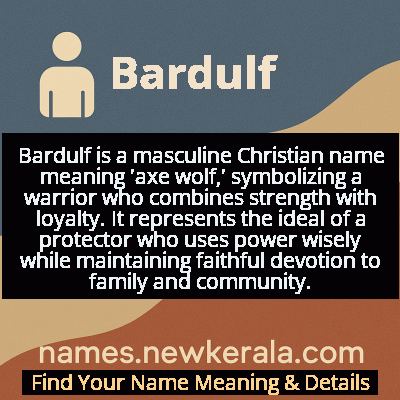Bardulf Name Meaning & Details
Origin, Popularity, Numerology Analysis & Name Meaning of Bardulf
Discover the origin, meaning, and cultural significance of the name BARDULF. Delve into its historical roots and explore the lasting impact it has had on communities and traditions.
Name
Bardulf
Gender
Male
Origin
Christian
Lucky Number
1
Meaning of the Name - Bardulf
Bardulf is a masculine Christian name meaning 'axe wolf,' symbolizing a warrior who combines strength with loyalty. It represents the ideal of a protector who uses power wisely while maintaining faithful devotion to family and community.
Bardulf - Complete Numerology Analysis
Your Numerology Number
Based on Pythagorean Numerology System
Ruling Planet
Sun
Positive Nature
Leaders, ambitious, highly driven, self-reliant, innovative.
Negative Traits
Overly aggressive, domineering, impatient, selfish.
Lucky Colours
Red, orange, gold.
Lucky Days
Sunday.
Lucky Stones
Ruby, garnet.
Harmony Numbers
2, 3, 9.
Best Suited Professions
Entrepreneurs, managers, engineers.
What People Like About You
Courage, determination, leadership.
Famous People Named Bardulf
Bardulf of York
Clergyman
Archdeacon of York who played a significant role in English ecclesiastical affairs
Bardulf de Limesey
Norman noble
Companion of William the Conqueror who received extensive land grants
Bardulf FitzWarin
Knight
Member of the FitzWarin family who served in royal courts
Name Variations & International Equivalents
Click on blue names to explore their detailed meanings. Gray names with will be available soon.
Cultural & Historical Significance
The name's dual nature—combining the destructive power of the axe with the protective loyalty of the wolf—made it particularly suitable for men expected to be both warriors and defenders of their communities within the Christian feudal system. This symbolism aligned well with Christian ideals of spiritual warfare and protection of the faithful, allowing the name to maintain relevance even as societies became more Christianized. The presence of Bardulfs in ecclesiastical positions demonstrates how the name transitioned from purely martial connotations to include spiritual leadership roles.
Extended Personality Analysis
Individuals named Bardulf are typically perceived as possessing a unique blend of strength and loyalty, reflecting the name's warrior-wolf symbolism. They often demonstrate protective instincts toward family and community, combined with strategic thinking and resilience in challenging situations. The axe component suggests decisiveness and the ability to cut through complexity, while the wolf aspect indicates strong social bonds, intuition, and endurance.
These individuals tend to be natural leaders who balance authority with compassion, often taking on protective roles in both personal and professional contexts. Their personality typically combines courage with wisdom, making them reliable in crises while maintaining a deep sense of responsibility toward those in their care. The Christian context of the name adds a dimension of moral strength and ethical decision-making, suggesting someone who uses their power and influence for righteous purposes rather than personal gain.
Modern Usage & Popularity
In contemporary times, Bardulf remains a rare but distinctive choice, primarily used by parents seeking unique historical names with strong masculine connotations. Its usage is most common in Germany, England, and among communities with strong medieval historical interests. The name has seen a slight resurgence in recent years as part of the 'old names' revival trend, though it remains outside the top 1000 names in most English-speaking countries. Modern bearers often appreciate the name's historical depth and the powerful imagery it evokes, while its rarity ensures distinctiveness in an era of common names. The Christian association continues to make it appealing to religious families seeking names with both historical and spiritual significance.
Symbolic & Spiritual Meanings
Symbolically, Bardulf represents the ideal of the Christian warrior—someone who wields power responsibly while maintaining loyalty and protective instincts. The axe symbolizes decisive action, justice, and the ability to overcome obstacles, while the wolf represents family loyalty, intuition, and survival wisdom. Together, they create a powerful metaphor for balanced masculinity: strength tempered by loyalty, authority guided by protection, and power exercised with wisdom. In Christian contexts, this symbolism extends to spiritual warfare—fighting against sin and evil while protecting the faithful and maintaining devotion to God and community, making it a name that embodies both earthly and spiritual guardianship.

